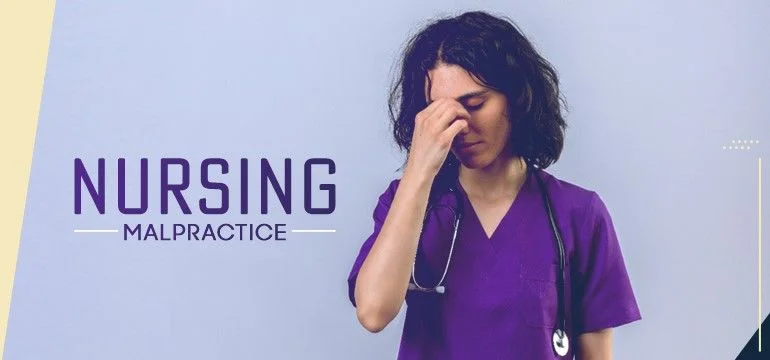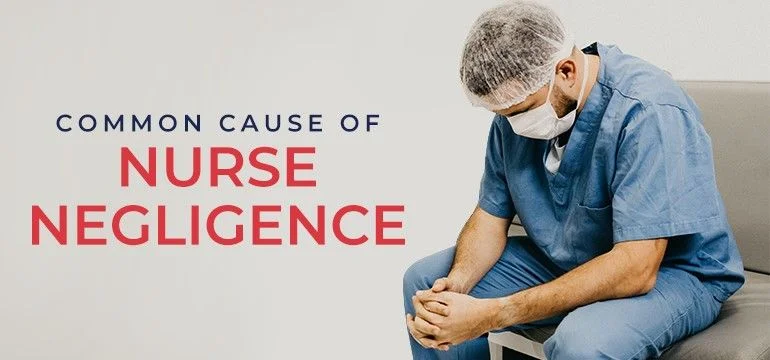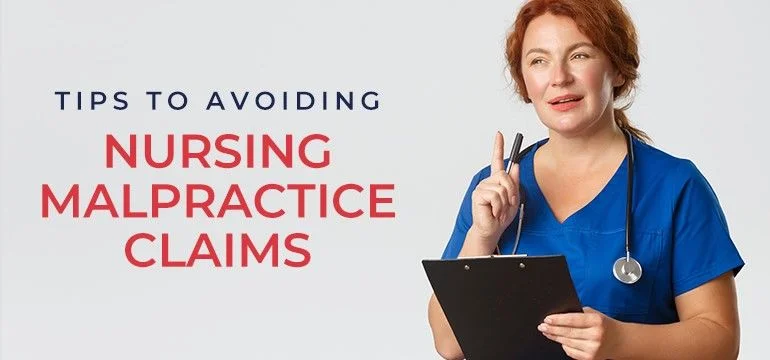
In today's time, with commercial laws becoming stringent, ordinary negligence or professional negligence can result in expensive lawsuits that can cost you your time and money.
Any legal problem can damage your reputation and result in loss of credibility and trust in the workplace.
Medical malpractice laws in the US take its origin from English common laws that are derived from the rulings in different state courts. Such laws are a common occurrence in the United States.
It is estimated that each year more than 40,000 injury cases are reported in the US due to negligence of nursing staff as per the Journal of Patient Safety.
Nurses are an important part of the patient support and healthcare system. However, considering the demand of the occupation and the probability of error, care methods or records, they are still subjected to various malpractice lawsuits.
According to American Nurse Today, the malpractices against nurses are the consequences of a variety of the following issues:
If you lack any of the skills mentioned above, it can actually be catastrophic for patients. For instance, if a nurse administers dosage of a drug and does not document it, another nurse may administer another dosage that could lead to overdose.
According to Critical Care Nurse Journal, one of the most prominent causes of medical error is the adverse drug dosages.
More than 30% of medical malpractice are based on drug related medical errors. A patient can suffer from adverse medical reactions if given the wrong medication. Moreover, injuries can also be caused due to incorrect drug administering

It is believed that medical malpractice is the third top cause of death behind ailments such as cardiac disease and cancer.
If you know someone who has been a victim of medical negligence, you must be well aware of how daunting, exhausting and emotional it can be.
Nursing negligence may not qualify on merit as a suit, but if the negligence causes death or injury, you can be entitled for damage compensation.
If a nurse does not uphold the international standard of care, both mother and child are at risk of injury during childbirth.
Children can suffer injuries like bone fractures, brain damage etc. during childbirth, while mothers can be a victim of vaginal damage if proper protocols are not followed.
Most errors that happen during surgeries are not intentional. However, there are certain instances where these errors qualify as nursing negligence.
For instance, if a surgeon leaves any instrument behind by mistake or performs the surgery on the wrong site is termed as medical negligence in the court of law.
If a person is prescribed medicine with the wrong dosage, or have suffered a major illness/injury due to the medication, the situation is thus classified as medical negligence.
All prescription errors that are made by medical experts are classified under malpractice.
When a patient is admitted in the ER or suffers from a condition that requires anesthesia, it is critically important for healthcare professionals to take all the details in regards to the patients' health status and medical history into consideration.
If you administer the wrong dosage of anesthesia, or a wrongly done procedure in the emergency room can cause death or harm. Without taking the consideration of a patient's situation or taking care of the minutest of detail, a nurse or a doctor may cause negligence.
One of the scariest situations for a doctor is to figure out there has been misdiagnosis, or a health situation that remains undiagnosed. Similarly, not offering adequate treatment for the health condition. Sadly, misdiagnosis can cause complications or untimely death.
The first medical malpractice lawsuit took place in 1164 in England. The case was known as Everad v. Hoskins which involved a servant and his owner pressing charges to collect damages from a physician charged for unwholesome medicine.
A jury ordered John Hopkins Hospital to pay $190 million to almost 8000 plaintiffs. This was done on behalf of Dr. Nikta Levy, a gynaecologist with experience of more than 25 years.
It was revealed that the doctor was taking pictures and videos of his patients with a pen like camera that he wore to examinations.
Levy was fired and more than 1200 videos were acquired from him. After this case was reported, the doctor committed suicide few days later.
Once the proceedings finalized, the plaintiffs were mailed checks as compensation.
Back in 2009, everyone was saddened and shocked to hear the sudden and tragic demise of Michael Jackson.
Once the toxicology and autopsy reports it was deduced that Jackson died due to the different drugs in his body. This included Propofol, an anesthetic used during surgeries. The drug has a variety of side effects that need to be monitored constantly by a team of physicians.
Later it was deduced that Jackson's in-home physician, Dr. Conrad Murray used to regularly administer the drug to him so that he slept soundly through the night.
Dr. Murray was thus arrested and accused of manslaughter for Jackson's death, however the medical malpractice charges weren't pursued by the plaintiff.

If you are a nurse living in the United States, there are a variety of things you can do to limit the probability of malpractice discussed as follows:
You must have noticed that private clinics and hospitals are now crammed with people. This makes it extremely difficult for doctors to give patients the care they deserve. In situations where patients are lined up, healthcare professionals and nurses tend to expedite their service. This can result in omissions or mistakes exposing a nurse to malpractice suits.
Irrespective of the pressure where medical staff is forced to see as many patients as possible. An important aspect of the clinical workflow or a licensed nurse is to gauge how many patients can be scheduled within a day and how many can actually be catered.
For instance, if a healthcare expert missed a symptom or forgets to take detailed data regarding allergies, health or lifestyle, the repercussions can be fatal or adverse. Be there for all your patients to foster long term progressive relationships.
With the popularity of electronic health information exchange, the quality of care patients receive has been revolutionized.
This has made it easier to share and access health records, while the data may be encrypted and safe, it can still be unnerving for patients.
Electronic records are extremely secure as compared to traditional filing methods, when it comes to patient records, health concerns and lab reports.
People tend to keep their information confidential, the theft of patient information is a serious concern. Similarly, so are the liability for care organizations who access the records.
Despite the patient being aware of the nature of consent for healthcare providers pertaining to electronic health records, it is increasingly important for patients to thoroughly review and then sign the consent form.
In the near future, it is projected that we'll have the ability to share their lifestyle and health condition with providers irrespective of the state they live in or travel to.
For now, it is important to carefully review the consent form and how the data you provide will eventually be used.
For all states, nursing colleges provide a variety of continued education training courses that all nurses need to take annually.
The competency requirements are a reflection of the minimum learning hours that a nurse should complete in order to be in compliance with the procedural and structural changes to the profession.
On the other hand, in order to improve performance, nurses are required to meet the criterion which is far above the annual basic requirements to further hone their skills.
During a malpractice suit, those nurses who have regularly been a part of continuing education and training are likely to defend themselves better.
Nurses working in the ER are likely to experience this on a frequent basis. If a patient seems to be having an uncomfortable symptom or mild emergency, misdiagnosis if often possible.
However, even if there is a minor delay in referral or involving a specialist, the nurse can be at the verge of a malpractice suit by the patient.
This is particularly true in cases where the symptom was misunderstood or ignored and the condition quickly became life threatening.
The human brain can process and remember from 10 terabytes to more than 100 terabytes of memory.
However, when you mix the demand of emergency situations, multiple patients, and long continental shift work, it's not hard to imagine missing a detail or two on your report.
Negligence can be primarily defined as the inability to take adequate care or steps to avoid or prevent injury or loss to another person.
In the healthcare sector, negligence takes place when a healthcare professional does not take adequate steps or preventive measures to prevent injury or loss to a patient.
While your employer may carry an organizational policy, nurses are highly recommended to have their own liability insurance because of several benefits:
Please take note that the information presented here are general advice only and does not constitute legal or financial advice. For further information, it is best to consult your employer about liability policy in place.
The four elements of malpractice in nursing include:
In case you are sued for malpractice, your nursing license will be revoked whatsoever.
As per the recent CNA and NSO liability claim report, on an average, the nurse's malpractice claim can cost roughly $164,586.
The attorney fees on an average to defend such nurse malpractice claims is roughly 37,084.2.
If you take the past NSO/CNA reports into consideration, you will notice that the nursing malpractice cost has increased exponentially.
Some hospitals are able to shoulder the cost of litigation especially if there is a liability policy in place that covers the whole medical staff.
But there are cases that even with the presence of a policy, the hospital may refuse to assist a nurse or a doctor for malpractice suit if the administration believes the person in question acted in bad faith.
Please take note that the information presented here is general advice only and does not constitute legal or financial advice.
For further information, it is best to consult your employer about liability policy in place.